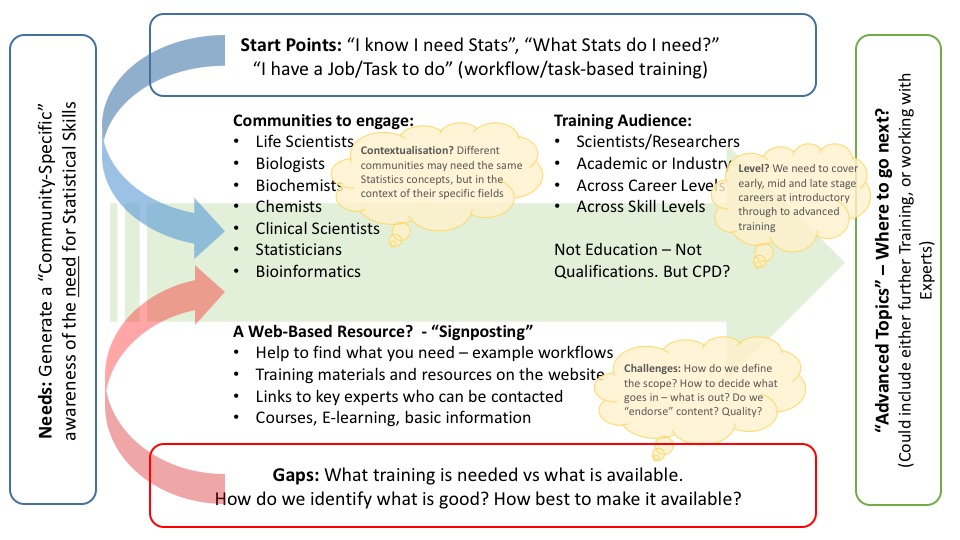StaTS project. a skills challenge.
Many organisations serving the UK science community (funding councils, professional bodies & industry organisations) have recognised the need for improved training in a wide range of key skills - and have published several reports on the sector.
One particular need stood out above all others - a lack of skills in statistics.
Emerging national challenge
The emerging picture of skills need resulted in a meeting in Q4 2014 coordinated by the Association of British Pharmaceutical Industry (ABPI) as a sub-project of the Science Industry Partnership (SIP), to bring together all parties interested in addressing skills gaps in the sector.
Quantitative skills - and statistics in particular - was identified as a common need, and a Working Group was established to look at ways in which we could address this need.
The Statistics Working Group is chaired by Lee Larcombe and brings together the following stakeholders:
- Cogent Skills / SIP
- Association of British Pharmaceutical Industry
- ELIXIR-UK
- Biotechnology & Biological Sciences Research Council
- Medical Research Council
- EMTRAIN (EMBL-EBI)
- Royal Society of Chemistry
- The Biochemical Society
- Society of Biology
This group met for the first time in Q1 2015 and focused on identifying the scientific communities we needed to engage, the types of learner/trainer we should help – and their scientific needs, interests and background understanding/context. We have the challenge of providing training from a very early career stage, right through to well-established (late stage) researchers. However, we must also ensure that training can be provided from basic, introductory materials through to advanced topics – and recognize that what we define as “introductory”, “intermediate” or “advanced” skills may not necessarily align with career stage, and may vary depending on scientific context or community.
As well as considering existing skill and career level, the self-determined needs of the trainee, and their immediate technical challenges; we should also be mindful of the need for ongoing development - where they go next. There was general consensus that we are not a group to tackle education, but specifically career-related training and as such, it is likely that on-line or short course training would be most suitable for a career scientist.
Key ideas are summarised in the diagram below - these were then used as a source of discussion with an Expert Panel. From this meeting the project gained the name Statistics Training Signposting project (StaTS)

Engaging experts
The Expert Panel (chaired by Lee Larcombe), brought together in Q3 2015 was made up of the following:
- Deborah Ashby, Professor of Medical Statistics and Clinical Trials, and Co-Director of the Clinical Trials Unit, Imperial College London.
- Conrad Bessant, Professor of Bioinformatics, QMUL.
- Peter Diggle, Royal Statistical Society president.
- Hannah Kowszun, Director of Marketing and Communications at the Science Council.
- Debbie Lawlor, Professor of Epidemiology, Bristol.
- Andrew Mead, Head of Applied Statistics, Rothamsted Research.
- Gill Smith, Independent Consultant.
- Maria Viskaduraki, Biostatistics manager, Bioinformatics and Biostatistics Hub, Leicester.
- Darren Wilkinson, Professor of Stochastic Modelling in the School of Mathematics & Statistics, Newcastle.
The discussion centered around two key points:
1. Discussion on Needs: We all know that training in statistics is needed - across a range of skill/experience levels, and a diverse range of disciplines. What we need to do is try and understand the true nature of this diversity - ie how different, in real terms, are the needs of our different disciplines/communities? Are there important basics that can be applied across the board - what are they? What then are the discipline-specific needs?
2. Focus on impact: We will not be able to solve all of the problems. However, we should aim to come away from this meeting having considered how we can make (a) the most immediate, and (b) the most significant impact on this skills gap.
The discussion quickly established that in general, there appears to be enough good training opportunities/materials available. Some of the most useful online resources are linked from the drop down menu above.
Given this, it was felt the key issues were:
How to overcome barriers such as fear of stats/computing
Moving forward to begin to address the challenge
The Expert Panel made 5 key recommendations, which will now form the basis of future developments:
- Investigate whether we can implement a “Common Statistics Competence Framework” for self-evaluation
- Look at developing personas/competencies/case studies to match different career levels/stages
- Promote the importance of basic computing and R courses before learning Statistics – develop a programme of incremental courses
- Gather examples and case studies to highlight the need to develop a good statistical understanding and to apply statistical approaches properly
- Develop the signposting element to highlight “next steps’ from either courses or self-assessment
Key Sector Reports
The SIP new (2016) skills strategy is available here
A view of the skills gap from the ABPI (2015) is available here
The MRC and BBSRC published a report on Vulnerable Skills (2014) which is available here (MRC) or here (BBSRC)
ELIXIR-UK's industry skills survey (2014) is available here
back to top